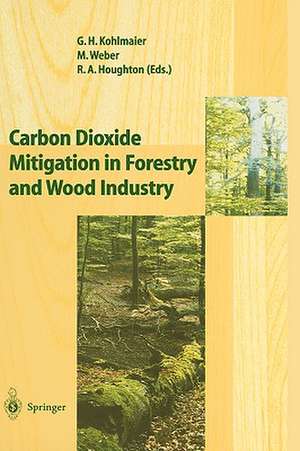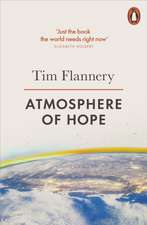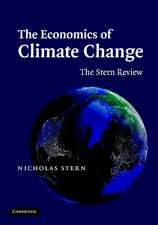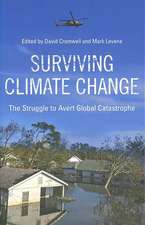Carbon Dioxide Mitigation in Forestry and Wood Industry
Editat de Gundolf H. Kohlmaier, Michael Weber, Richard A. Houghtonen Limba Engleză Hardback – 7 apr 1998
| Toate formatele și edițiile | Preț | Express |
|---|---|---|
| Paperback (1) | 949.73 lei 6-8 săpt. | |
| Springer Berlin, Heidelberg – 14 dec 2010 | 949.73 lei 6-8 săpt. | |
| Hardback (1) | 956.18 lei 6-8 săpt. | |
| Springer Berlin, Heidelberg – 7 apr 1998 | 956.18 lei 6-8 săpt. |
Preț: 956.18 lei
Preț vechi: 1166.08 lei
-18% Nou
Puncte Express: 1434
Preț estimativ în valută:
182.96€ • 190.66$ • 151.49£
182.96€ • 190.66$ • 151.49£
Carte tipărită la comandă
Livrare economică 03-17 aprilie
Preluare comenzi: 021 569.72.76
Specificații
ISBN-13: 9783540634331
ISBN-10: 3540634339
Pagini: 412
Ilustrații: XXIX, 378 p.
Dimensiuni: 156 x 234 x 28 mm
Greutate: 0.75 kg
Ediția:1998
Editura: Springer Berlin, Heidelberg
Colecția Springer
Locul publicării:Berlin, Heidelberg, Germany
ISBN-10: 3540634339
Pagini: 412
Ilustrații: XXIX, 378 p.
Dimensiuni: 156 x 234 x 28 mm
Greutate: 0.75 kg
Ediția:1998
Editura: Springer Berlin, Heidelberg
Colecția Springer
Locul publicării:Berlin, Heidelberg, Germany
Public țintă
ResearchDescriere
The lntergovernmental Panel on Climate Change (IPCC) has recently summarized the state ofthe art in research on climate change (Climate Change 1995). The most up to date research findings have been divided into three volumes: • the Science ofClimate Change (working group I), • the Impacts, Adaption and Mitigation of Climate Change (working group II), and • the Economic and Social Dimensions ofClimate Change (working group III) There is a general consensus that a serious change in climate can only be avoided if the future emissions of greenhouse gases are reduced considerably from the business as usual projection and if at the same time the natural sinks for greenhouse gases, in particular that of CO , are maintained at the present level or 2 preferrably increased. Forests, forestry and forestry industry are important parts of the global carbon cycle and therefore they are also part of the mitigation potentials in at least a threefold way: 1. During the time period between 1980 and 1989 there was a net emission of CO from changes in tropical land use (mostly tropical deforestation) of 2 1. 6 +/- 1 GtC/a, but at the same time it was estimated that the forests in the northem hemisphere have taken up 0. 5 +/- 0. 5 GtC/a and additionally other terrestrial sinks (including tropical forests where no clearing took place) have been a carbon sink ofthe order of l. 3 +/- l.
Cuprins
List of Contents.- 1 Forest Resources: Past, Present and Future Role of Managed and Unmanaged Forests in the Global Carbon Balance.- 1.1 Historic Role of Forests in the Global Carbon Cycle.- 1.2 The History and Future Dynamics of Carbon Sequestration in Finland’s Forest Sector.- 1.3 Dynamics of Forest Resources of the Former Soviet Union with Respect to the Carbon Budget.- 1.4 Past and Possible Future Carbon Dynamics of Canada’s Boreal Forest Ecosystems.- 1.5 Assessment of Humid Tropical Forest Distribution and Conditions Using Remote Sensing at a Global Scale.- 2 Implementation of Carbon Dioxide Mitigation Measures in Forestry and Wood Industry on a National and International Scale.- 2.1 Analysis and Potential for Mitigation Options.- 2.2 Carbon Mitigation Potential of German Forestry Considering Competing Forms of Land Use.- 2.3 Present and Future Options of Forests and Forestry for CO2-Mitigation in Germany.- 2.4 Afforestation in Europe: Experiences and Future Possibilities.- 2.5 Implementing Carbon Mitigation Measures in the Forestry Sector — a Review.- 3 Quantitative and Qualitative Evaluation of Carbon Dioxide Mitigation in Forestry and Wood Industry.- 3.1 World Forests: The Area for Afforestation and their Potential for Fossil Carbon Sequestration and Substitution.- 3.2 Substitution of Wood from Plantation Forestry for Wood from Deforestation: Modelling the Effects on Carbon Storage.- 3.3 Life Cycle Assessment of Wood Products.- 3.4 The Face Foundation.- 3.5 Climate Stabilisation and Conservation of Biodiversity — Two Goals — One Way?.- 4 Forestry Mitigation Options under Future Climate Change and Socioeconomic Pressures.- 4.1 Future Development of the Carbon Cycle: The Role of the Biota/Forests within the IPCC Stabilisation Scenarios.- 4.2 The Frankfurt Biosphere Model (FBM): Regional Validation Using German Forest Yield Tables and Iventory Data and Extrapolation to a 2×CO2 Climate.- 4.3 The Direct Effect of CO2 Enrichment on the Growth of Trees and Forests.- 4.4 Ecosystem Properties and the Continued Operation of the Terrestrial Carbon Sink.- 4.5 The Distribution of Future Global Forests as Affected by Changing Climate and Land Use.
Caracteristici
The book combines scientific carbon assessment with practical solutions of industry and policy makers.












